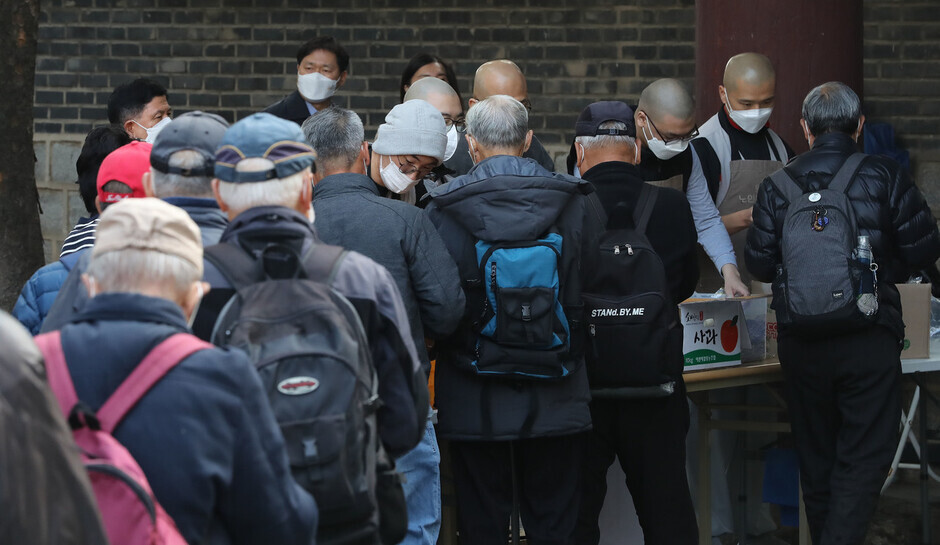hankyoreh
Links to other country sites 다른 나라 사이트 링크
Older, less-educated S. Koreans more likely to die from COVID-19

A comprehensive survey of Koreans who died from COVID-19 over the past year found that the percentage of elderly people with no education who died was twice as high as the percentage of unschooled individuals in the overall elderly population. That crystallizes concerns that older people with little education or income are more vulnerable to contracting COVID-19 and have a worse prognosis for treatment.
A Hankyoreh analysis of data from a comprehensive survey of COVID-19 victims in 2020 provided by Statistics Korea found that older people (aged 60 and above) accounted for 905 of 950 COVID-19 fatalities last year, or 95.3% of the total. In that group, 149 individuals, or 16.5%, had no level of formal educational attainment. That was more than double the share of unschooled individuals (7.4%) in the total 60-and-above population.
Among older people who have died of COVID-19, the percentage who are less educated — a category that includes those who have graduated from elementary school — was 45.3% (410 individuals). That was 50% higher than the share of their cohort in the total population (30.9%).
The authorities did not have data about the educational attainment for 5.7% (52) of the deceased older victims of COVID-19.
This survey was conducted using the death certificates that the government compiles upon an individual’s death. Because microdata from Statistics Korea isn’t linked to data from the National Health Insurance Service, the Hankyoreh was unable to confirm the income level of the deceased. But given the strong correlation between levels of education and income in Korea, the results of this analysis appear to show that less-educated, lower-income older people have especially poor therapeutic outcomes following COVID-19 infection.
“In Korea, where educational attainment denotes one’s socioeconomic status, there have been more COVID-19 infections and deaths among people who are poor and less educated. That tendency has been seen not only in COVID-19 deaths but also in excess mortality,” said Kim Yoon, a professor of health policy and management at Seoul National University.
Excess mortality is defined as deaths that exceed the number statistically expected to occur in a given period of time.
“Harm from infectious disease has ultimately been distributed unevenly, and Korean society has failed to protect less-educated, low-income elderly people from COVID-19,” Kim said.
These analytical findings show that the majority of deaths occurred in demographic cohorts that are less able to practice social distancing rules.
“The government can emphasize disease control regulations all it likes, but these older people are inevitably exposed to enclosed and crowded spaces where they come into close contact with others. We need to keep an eye on people with less education and lower incomes to prevent inequality from occurring in the aftereffects of a COVID-19 treatment regime or in the recovery phase,” said Hwang Seung-sik, a professor of epidemiology at the Seoul National University Graduate School of Public Health.
Others argue that Korean society needs to address the pandemic-related inequality deriving from disparities in educational attainment, income, age, and region. The fact that basic statistics about COVID-19 deaths in 2020 have only become available a year later has also sparked criticism.
“I don’t think the government has been proactive about releasing or analyzing data and, what’s worse, I think that neglect has been deliberate. There’s no telling how long COVID-19 will be here, so it’s critical that we develop measures to protect vulnerable groups right now,” said Kim.
By Lee Jae-ho and Kwon Ji-dam, staff reporters
Please direct questions or comments to [english@hani.co.kr]

Editorial・opinion
![[Column] Samsung’s ‘lost decade’ and Lee Jae-yong’s mismatched chopsticks [Column] Samsung’s ‘lost decade’ and Lee Jae-yong’s mismatched chopsticks](https://flexible.img.hani.co.kr/flexible/normal/500/300/imgdb/original/2024/0512/3017154788490114.jpg) [Column] Samsung’s ‘lost decade’ and Lee Jae-yong’s mismatched chopsticks
[Column] Samsung’s ‘lost decade’ and Lee Jae-yong’s mismatched chopsticks![[Correspondent’s column] The real reason the US is worried about Chinese ‘overcapacity’ [Correspondent’s column] The real reason the US is worried about Chinese ‘overcapacity’](https://flexible.img.hani.co.kr/flexible/normal/500/300/imgdb/original/2024/0510/5217153290112576.jpg) [Correspondent’s column] The real reason the US is worried about Chinese ‘overcapacity’
[Correspondent’s column] The real reason the US is worried about Chinese ‘overcapacity’- [Editorial] Yoon’s gesture at communication only highlights his reluctance to change
- [Editorial] Perilous stakes of Trump’s rhetoric around US troop pullout from Korea
- [Guest essay] Preventing Korean Peninsula from becoming front line of new cold war
- [Column] The state is back — but is it in business?
- [Column] Life on our Trisolaris
- [Editorial] Penalties for airing allegations against Korea’s first lady endanger free press
- [Editorial] Yoon must halt procurement of SM-3 interceptor missiles
- [Guest essay] Maybe Korea’s rapid population decline is an opportunity, not a crisis
Most viewed articles
- 1Seoul’s plan to adopt SM-3 missiles is like wanting a sledgehammer to catch a fly
- 2[Column] Samsung’s ‘lost decade’ and Lee Jae-yong’s mismatched chopsticks
- 3Yoon rejects calls for special counsel probes into Marine’s death, first lady in long-awaited presse
- 4S. Korea “monitoring developments” after report of secret Chinese police station in Seoul
- 5Yoon voices ‘trust’ in Japanese counterpart, says alliance with US won’t change
- 6[Correspondent’s column] The real reason the US is worried about Chinese ‘overcapacity’
- 7Korea poised to overtake Taiwan as world’s No. 2 chip producer by 2032
- 8US expert says THAAD can’t distinguish between real and decoy warheads
- 946% of cases of violence against women in Korea perpetrated by intimate partner, study finds
- 10‘We must say no’: Seoul defense chief on Korean, USFK involvement in hypothetical Taiwan crisis